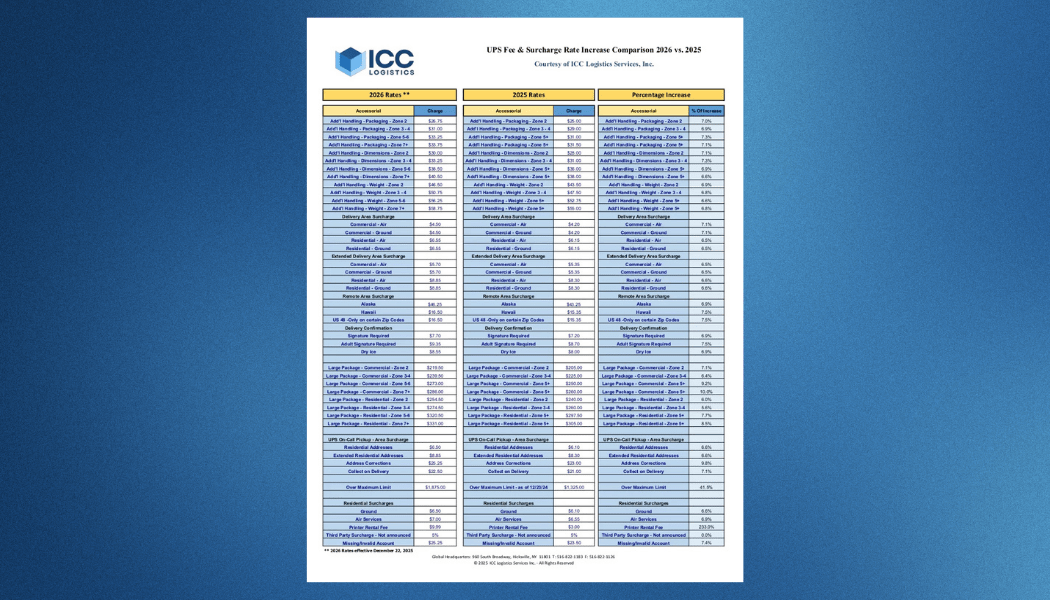Welcome to our new series, “The Devil’s in the Details” where each month, we will uncover the hidden costs you never knew you were paying! Learn about hidden costs and charges and get the tools you need to finally take control over your logistics spend!
As every shipper knows, (or at least should know), every freight carrier publishes their own Service Guide or Rules Tariff. These Service Guides and/or Rules Tariffs provide a very comprehensive and detailed list of rules, regulations, definitions, terms, and include specified fees and charges for the various services the carriers provide.
Also, often times shippers and their freight carriers will negotiate and enter into individual Transportation Contracts which detail the services the carrier’s agree to provide along with the fees and charges the carrier will assess when those services are rendered.
Unfortunately, many shippers are not aware that the provisions in their individual contracts are almost always subject to the terms and conditions of the carrier’s Service Guide or Rules Tariff. And, to completely complicate matters, the Contract and the Service Guide or Rules Tariff will typically state which will take precedence when there are conflicts between provisions agreed to in the Contract and the provisions published in the Service Guide and/or the Rules Tariff.
If this sounds confusing, it absolutely is. Unfortunately, it is up to every shipper to make certain they fully understand all of the terms and conditions they will be subject to for each and every freight carrier they utilize. Today, there are NO standards when it comes to terms and conditions from carrier to carrier. Each and every freight carrier publishes terms, conditions, rules, regulations and fees that meet their own needs and their shipper customers are typically subject to all of those provisions.
But here is the good news; a shipper doesn’t have to subject themselves to all of the terms and conditions each and every freight carrier publishes. They do have the ability to change, modify and/or completely waive specific provisions in their contracts with the carriers.
This is why shippers, prior to entering into any transportation agreement should engage a competent transportation and logistics consultant or transportation attorney to review the contract terms and conditions, the Rules Tariff and or Service Guide.
These individuals provide expert guidance to the shipper so that it doesn’t agree to terms and conditions that are not favorable to them. Here is one such example.
In researching one carrier’s Rules Tariff for a client, we came across this very interesting Rules Tariff provision because this particular Rules Tariff provision is something we are sure no shipper expects to agree to.
“When Carrier or Agent is required to perform a pickup/delivery and when parking/unloading facilities are unavailable, and in the performance of applicable service Carrier “double parks”, liability for the fine(s) incurred for that action will be assessed against the payor of the freight charges unless payment has been guaranteed to the satisfaction of Carrier by the consignor, consignee or a third party”.
Yes, believe it or not, when shipments are tendered to this particular carrier and the carrier receives parking violation fines, the shipper who made the shipment or the consignee receiving the shipment, (depending on who is paying the freight charges), will be ultimately responsible for paying those parking violation fines. Bet you never heard of this one before!
So this begs a few questions:
- How many shippers are aware they will be paying parking fines when the carrier incurs such fines? We suspect not many at all. Probably none!
- What proof will the carrier provide to the shipper or receiver that the parking fine was directly attributable to a specific shipment?
- To make matters even more interesting, the rule in this carrier’s Rules Tariff provides no requirement for the carrier to provide any proof a specific shipment was responsible for the fine in the first place.
- What if the driver is making multiple deliveries in the same building, which shipper or receiver gets billed for the parking fine?
- Is it possible that each of the shippers or receivers in that multiple shipment delivery will be required to pay for the fine and who is going to monitor the fact that this could become a “profit center” for the carrier?
- How does the carrier even manage the billing of these fines to the shippers or consignees; this has to be a billing and payment reimbursement nightmare.
- Will the carrier attempt to collect the fines from the shipper or consignee and wind up just absorbing the fine if the shipper or consignee refuses to pay the fine?
- How much good will does the carrier generate by invoicing their customers for parking fines….ABSOLUTELY NONE!
- One point that is very clear to us is that while this tariff provision is intended to recover costs the carrier has experienced, it will only serve to add additional costs on the carrier’s side of the ledger to monitor and ultimately collect these parking fine reimbursements.
- So why did the carrier initiate this pricing provision in the first place? I guess we’ll have to ask the carrier.
Finally and most importantly, one hard lesson learned from this particular Rules Tariff provision and others that shippers are faced with day after day. Shippers and receivers should take nothing for granted when negotiating with freight carriers. They should always rely on experts to weed out these nagging and often times very costly pricing provisions BEFORE they enter into any transportation agreement.



 to receive our FREE white papers:
to receive our FREE white papers: